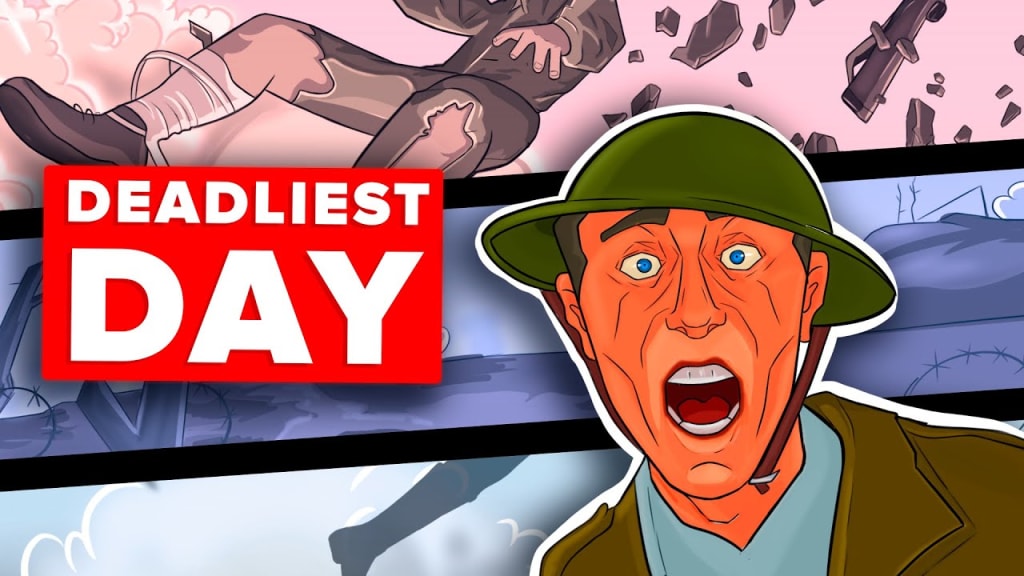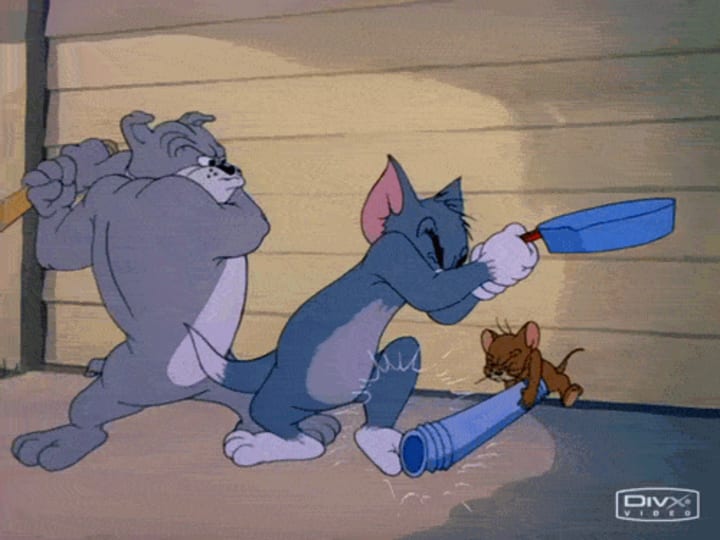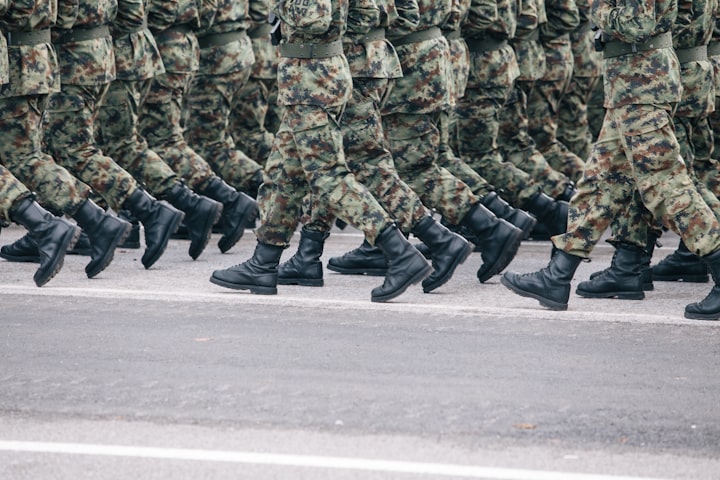
WWI witnessed around 40 million losses on both sides, but what was the single bloodiest day of WWI? To uncover, get a take on this amazing new narrative! 🏴☠️🤬💀💣🏴☠️
At 7:23 a.m., the Mash Valley-British Lines experienced an earthquake. Private John Henry could feel the ground tremble and groan even from about 800 yards away due to the impact of the powerful British shells. Good God, he thought, there must not be anything left of them. For five days in a row, British guns had pounded German positions, consuming 1. The largest sustained barrage in human history used 7 million shells. The objective was to simply overwhelm the Germans with superior firepower from a distance, causing their trenches to collapse, their soldiers to perish, and their fortifications and barbed wire to be destroyed. Despite recent reports of a French pivot to the south, morale was high among the British. The goal of the offensive across the Somne was to take out the German defenses and deliver a crushing blow, reclaiming lost French territory and forcing the Germans to leave their trenches.
However, the Germans had attacked Verdun and threatened to overwhelm the French line; as a result, the entire offensive depended entirely on the inexperienced British forces. Numerous other platoons were lined up next to and behind John and his platoon as they prepared to go up and over the top in a huge human wave of overwhelming numbers. The men laughed and made jokes because they knew that the Germans would be virtually extinct following the blistering barrage the British guns had delivered. However, as 7:30 AM drew closer, the soldiers started to become more silent. The laughter subsided. Men wore grave expressions. John was no man; he was 15 years old and had made up facts in order to enlist in the military. He had dreams of the glory of battle and wanted to contribute to the empire like many other young British boys.
The steel helmet on his head was too big for his boyish head, so he now nervously checked his rifle, at least being surrounded by friends made him happy. Men recruited from the same neighborhoods served together in "pals" battalions, a British policy. The men would be fighting alongside soldiers they had grown up with, which was intended to strengthen their sense of camaraderie and motivate them to exert more effort. The policy would turn out to be disastrous, wiping out entire units and leaving entire communities devoid of young men. And today would be one of the deciding factors in ending that policy, along with the biggest death toll in British history to date. Their lieutenant was standing next to the wooden ladder that led up and over the cliff, staring at his pocket watch.
One of the senior sergeants stood next to him and shouted encouragement. Move steadily and do not group the boys together. John nervously swallowed, wiping the perspiration from his hands. His mother had been adamantly opposed to him joining the army, but he had disregarded her objections in a letter he had sent her yesterday. He couldn't help but wonder if those words in the letter were going to be the last they ever heard from him. He forced those ominous ideas from his mind. The sergeants had been very explicit. This would essentially be a hurried walk through no man's land with a brief stop to round up some survivors. No force could possibly withstand such a ferocious bombardment. Men, get ready. After the lieutenant gave the order, there was a rustle of activity as the men checked their equipment three times.
The time was almost up. John prayed in a small voice. He tightly closed his eyes before wiping them with a fresh hand. He was astonished to find himself sobbing. Then all of a sudden, the room fell silent. The artillery ceased firing. John was aware of his own breathing. He and dozens of other men and boys stared at their lieutenant, hardly daring to breathe. What was happening? Why weren't they going over? The man then lowered his watch and nodded. And without saying another word, the man climbed the ladder and jumped off of it while carrying a revolver. The sergeant by the ladder began shouting commands after a brief period of blank stares from his platoon. Over you go, you stupid twits! You think the lieutenants will fight the entire war on their own? Go Go; the man slapped the backs of the soldiers, shoving them towards the ladder as they each climbed it one by one.
The scene was repeated a hundred meters to the left and right of them, on and on across miles of front as tens of thousands of British soldiers climbed out of their trenches. John didn't know what he'd pictured, but it wasn't this. One by one, each man went up the ladder and over the top, but it was almost comical how slow the entire process was. After a week of artillery and drill, he expected more urgency. The British army launched its largest offensive of the war one man at a time because there were a limited number of break points in the barbed wire outside the trench and only one man could use a ladder at a time. After two minutes, it was finally John's turn. The sergeant slapped him on the back encouragingly. Remember your training, and you will survive. Then it was up and over, John scrambling against the soft dirt churned up in front of the trench by the troops ahead of him.
Up and over at last, he saw an awe-inspiring sight: a vast swarm of British soldiers slowly moving forward at a quick pace. The men weren't running, but they weren't exactly strolling either. Each man moved at a brisk walk, rifle in hand, and peered through the light fog ahead of him. At this point, the enemy lines were over 800 yards away; running would have simply rendered the entire attack across this sector too exhausted to fight. Move your asses and do not clump—I said do not clump. The sergeant was now up and over the top as well, raising hell amongst the troops as he shepherded them across the field like a sheep dog. John watched his positioning relative to his fellow soldiers, doing his best not to clump so as to encourage the Sergeant to turn his wrath elsewhere. The fog made it difficult to see more than a hundred yards ahead, though the rising sun was slowly dispersing it. He was breathing heavily despite not being tired at all.
Hazarding a look back, he couldn't see friendly faces anymore, just a swarm of brown uniforms behind him. How far had they gone? Two hundred yards Three hundred He had no idea; he just kept his eyes focused on the lieutenant ahead of him, his revolver held up in the air as he advanced, another minute of fast walking; still no enemy fire. Had the artillery really finished them off, or were they still that far away? The sun had cleared up enough of the mist to improve visibility to about two hundred yards or so. Major Arthur Rollings of the British Lines swept the front with his binoculars to see how far Mash Valley had to go. Damning fog made it impossible to see the enemy's lines, but it had cleared enough that he figured his boys were about to reach the halfway mark.
Without dropping the binoculars from his eyes, he gave an order to one of his aides. Inform headquarters that the sector is up and running with no enemy activity. Visibility was about five hundred yards or so. All appears well. The aide confirmed the major's message and rushed off to transmit it via field phone. The message would go all the way to Field Marshal Sir Douglas Haig, who had requested frequent and constant updates from across the front. Finally, the Major dropped his binoculars, rubbing his eyes to soothe them from the strain. Hell's bells, Fritzies could all be dead after all. Not a shot has been fired yet. This war may—but the Majors' words were cut off by a low whine followed by a plume of dirt and smoke from the middle of no man's land. That was not supposed to happen. The German artillery was supposed to be destroyed.
Was this a single gun, throwing what fire it could to help its front-line defenders? The major soon got his answer. Mash Valley, No Man's Land John and the rest of the platoon froze in their tracks. The single shell had landed with a dull plopping sound in the soft earth in the middle of a group of soldiers. It hadn't exploded, but the superheated shell had created a smoking hole in the ground. Confused, John looked for one of the sergeants. They were all green; there was not a single veteran amongst them, including many of the sergeants. This was the closest they had ever come to death. You numb-wits don't just stand there; move yer arses or Ill-, but the sergeant's words were lost as the world exploded around John.
Mash Valley, British Lines Major Rollings watched incredulously as artillery began to rain down across the front. It was slow at first, but within seconds it picked up to a furious tempo. And it was very accurate; the Germans had expertly zeroed in their guns on the last four hundred or so yards of no man's land in front of their trenches. German guns hadn't been destroyed, and their fire was terrifyingly accurate. It was a trap; they must have known everything about the attack, down to the precise moment it would take place. Tears welled up in the Major's eyes as he saw scores of his men blown to pieces in front of him.







Comments
There are no comments for this story
Be the first to respond and start the conversation.